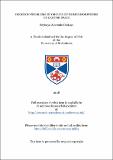Files in this item
Decision problems in groups of homeomorphisms of Cantor space
Item metadata
| dc.contributor.advisor | Bleak, Collin Patrick | |
| dc.contributor.author | Olukoya, Feyisayo | |
| dc.coverage.spatial | 169 p. | en_US |
| dc.date.accessioned | 2018-08-27T14:32:38Z | |
| dc.date.available | 2018-08-27T14:32:38Z | |
| dc.date.issued | 2018-12-06 | |
| dc.identifier.uri | https://hdl.handle.net/10023/15885 | |
| dc.description.abstract | The Thompson groups $F, T$ and $V$ are important groups in geometric group theory: $T$ and $V$ being the first discovered examples of finitely presented infinite simple groups. There are many generalisations of these groups including, for $n$ and $r$ natural numbers and $1 < r < n$, the groups $F_{n}$, $T_{n,r}$ and $G_{n,r}$ ($T ≅ T_{2,1}$ and $V ≅ G_{2,1}$). Automorphisms of $F$ and $T$ were characterised in the seminal paper of Brin ([16]) and, later on, Brin and Guzman ([17]) investigate automorphisms of $T_{n, n-1}$ and $F_{n}$ for $n>2$. However, their techniques give no information about automorphisms of $G_{n,r}$. The second chapter of this thesis is dedicated to characterising the automorphisms of $G_{n,r}$. Presenting results of the author's article [10], we show that automorphisms of $G_{n,r}$ are homeomorphisms of Cantor space induced by transducers (finite state machines) which satisfy a strong synchronizing condition. In the rest of Chapter 2 and early sections of Chapter 3 we investigate the group $\out{G_{n,r}}$ of outer automorphisms of $G_{n,r}$. Presenting results of the forthcoming article [6] of the author's, we show that there is a subgroup $\hn{n}$ of $\out{G_{n,r}}$, independent of $r$, which is isomorphic to the group of automorphisms of the one-sided shift dynamical system. Most of Chapter 3 is devoted to the order problem in $\hn{n}$ and is based on [44]. We give necessary and sufficient conditions for an element of $\hn{n}$ to have finite order, although these do not yield a decision procedure. Given an automorphism $\phi$ of a group $G$, two elements $f, g ∈ G$ are said to be $\phi$-twisted conjugate to one another if for some $h ∈ G$, $g = h⁻¹ f (h)\phi$. This defines an equivalence relation on $G$ and $G$ is said to have the $\rfty$ property if it has infinitely many $\phi$-twisted conjugacy classes for all automorphisms $\phi ∈ \aut{G}$. In the final chapter we show, using the description of $\aut{G_{n,r}}$, that for certain automorphisms, $G_{n,r}$ has infinitely many twisted conjugacy classes. We also show that for certain $\phi ∈ \aut{G_{2,1}}$ the problem of deciding when two elements of $G_{2,1}$ are $\phi$-twisted conjugate to one another is soluble. | en_US |
| dc.language.iso | en | en_US |
| dc.publisher | University of St Andrews | |
| dc.rights | Attribution-NonCommercial-NoDerivatives 4.0 International | * |
| dc.rights.uri | http://creativecommons.org/licenses/by-nc-nd/4.0/ | * |
| dc.subject | Group theory | en_US |
| dc.subject | Decision problems | en_US |
| dc.subject | Automorphisms | en_US |
| dc.subject | Thompson groups | en_US |
| dc.subject.lcc | QA178.O6 | |
| dc.subject.lcsh | Group theory | en |
| dc.subject.lcsh | Automorphisms | en |
| dc.subject.lcsh | Infinite groups | en |
| dc.title | Decision problems in groups of homeomorphisms of Cantor space | en_US |
| dc.type | Thesis | en_US |
| dc.contributor.sponsor | Carnegie Trust for the Universities of Scotland | en_US |
| dc.type.qualificationlevel | Doctoral | en_US |
| dc.type.qualificationname | PhD Doctor of Philosophy | en_US |
| dc.publisher.institution | The University of St Andrews | en_US |
| dc.publisher.department | Centere for Interdisciplinary Research in Computational Algebra | en_US |
The following licence files are associated with this item:
This item appears in the following Collection(s)
Except where otherwise noted within the work, this item's licence for re-use is described as Attribution-NonCommercial-NoDerivatives 4.0 International
Items in the St Andrews Research Repository are protected by copyright, with all rights reserved, unless otherwise indicated.


